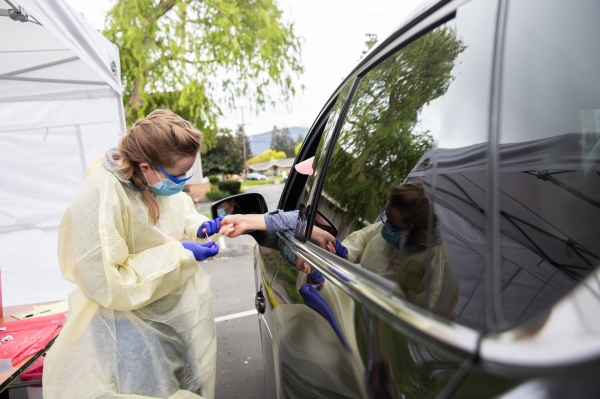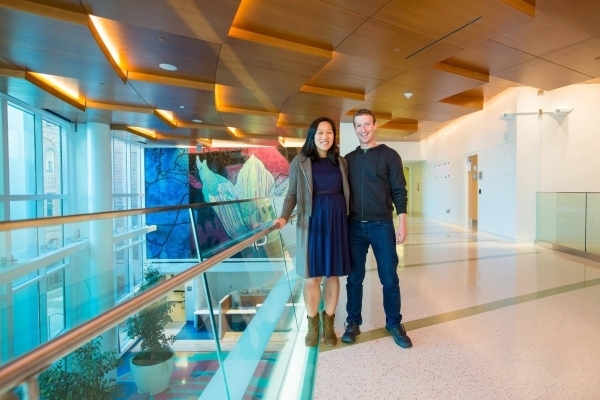Seeking to answer critical questions about the spread of COVID-19 in the Bay Area, Stanford University and the University of California, San Francisco are preparing to launch two large studies that would track and test thousands of residents and health care workers over the next nine months.
The studies, which are supported by a $13.6 million grant from the Chan Zuckerberg Initiative, comprise one of the Bay Area's most ambitious efforts yet to gauge the prevalence of the virus and determine whether those who had contracted it are immune from reinfection.
In the first of two studies, which the Chan Zuckerberg Initiative announced Wednesday, a consortium led by Stanford and UCSF researchers will recruit a representative sample of about 4,000 residents from across the Bay Area, each of whom had tested negative for COVID-19 and had followed the existing shelter-at-home guidelines.
The study will be led by Dr. Yvonne Maldonado, Stanford professor of pediatrics and of health research and policy at Stanford Medicine, and George Rutherford, professor of epidemiology, preventive medicine and pediatrics at UCSF. In the Wednesday announcement, Maldonado said the studies would enable researchers to learn "whether and how the virus spreads in the coming months and whether infection confers lasting immunity."
"This knowledge will be critical in coming months as we explore new treatment and prevention options for the novel coronavirus," Maldonado said.
Rutherford said the data produced by the study will be "not only instrumental in deciding when and how to relax our stringent public health interventions but also to monitor the population for new transmissions going forward."
"These data will be crucial to informing rational public health practice," Rutherford said in a statement.
Participants in this study will be tested once a month between May and December using polymerase chain reaction (PCR) tests, which typically rely on nasal swabs and which check for the virus' genetic material, and serological tests, which check blood samples for antibodies to COVID-19.
While PCR tests check for the presence of the virus at the time of testing, serological tests can demonstrate whether someone has had it in the past and has recovered. The new research effort is part of a growing number of prevalence studies undertaken by researchers across the world as nations consider strategies for reopening their economies.
Stanford researchers have already completed one prevalence study, though that study was based solely on serological tests of about 3,300 blood samples. The results of that study, which is now undergoing peer review and which has not been formally published, have stirred debate among researchers about the accuracy of test kits and the methods used to recruit participants.
In the new population study, viral genomes of all positive samples will be sequenced by researchers at the Chan Zuckerberg Biohub, a research center set up as a collaboration between Stanford, the University of California, Berkeley and UCSF. According to the announcement from the Chan Zuckerberg Initiative, the sequencing work will "identify local transmission chains or introductions of virus from outside the Bay Area, in addition to informing whether co-infections with other pathogens play a significant role."
"Altogether, the combined data will provide critical insights into the changing rates of COVID-19 infections as the Bay Area begins to return to work," the announcement states.
The second study will target about 3,500 health care workers, all of whom had previously tested negative for COVID-19. Participants will be tested weekly for 12 weeks using both PCR and serological testing to determine the rate at which workers acquire the disease. Those who test positive through serological testing — indicating that they had contracted the disease in the past even if they don't currently have it — will be followed in parallel through December.
Researchers expect the study to answer critical questions about whether antibodies actually confer immunity to the virus and whether reinfection is likely, according to the announcement.
Dr. Priscilla Chan, co-founder and co-CEO of the Chan Zuckerberg Initiative, said in a statement that "to reopen society and keep health care workers safe, we need to first understand the epidemiology of this disease.
"How much of our population is currently infected with COVID-19? How prevalent is asymptomatic spread? And how can we use this information to better understand who may still be at risk in the future? There is no shortcut to answering these questions – it will require testing, retesting and the sort of rigorous public health surveying this program is focused on in California," Chan said.
Find comprehensive coverage on the Midpeninsula's response to the new coronavirus by Palo Alto Online, the Mountain View Voice and the Almanac here.




Comments
Old Mountain View
on Apr 29, 2020 at 2:33 pm
on Apr 29, 2020 at 2:33 pm
We are fortunate to have the researchers and the financial resources in our community to make this study possible. Thank you!
OTOH, we are now 4-5 months into this epidemic & it's been 2 months since the call for testing and followup as essential aspects of getting ahead of the epidemic was put out there. Other countries and localities (S. Korea for one) did much better at this. Because of the delays in testing & followup, lives have been lost or endangered, livelihoods disrupted, & all inconvenienced to a significant extent.
I hope these new tests shed some light & help lead us back to normality. But, look, we (society, government, business) have been far too slow to get these essential processes going. And, even with that, we have to rely on charity (thx Chan/Zukerberg!). In this regard, governments (local, state, national) have pretty much failed to react in a competent manner. Not exactly confidence building, eh?